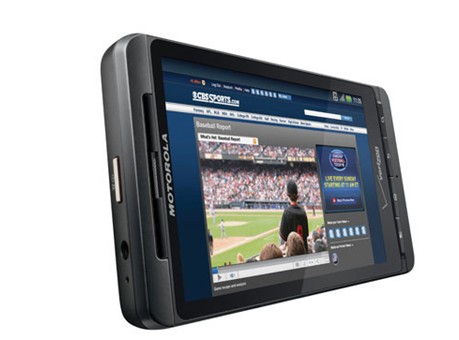
『谷歌与摩托罗拉的“联姻”带来的不仅仅是惊诧,对于手机行业来说,还有更为深远的影响。』
Google's purchase of Motorola Mobility:Arming Android
谷歌收购摩托罗拉移动: 武装“安卓”
Aug 15, 2011 | From The Economist

SHOCK. Bombshell. Incredible. Even seasoned observers of the technology industry could not hide their surprise when it was announced on Monday, August 15th, that Google, the online giant, would buy Motorola Mobility, a maker of handsets and other electronic devices, for a whopping $12.5 billion. The deal not only comes as a surprise, it will have a big impact on the mobile industry, too.
For starters, the merger is very good news for the shareholders of Motorola Mobility, among them Carl Icahn, the activist investor. The offer—$40 a share in cash—is 63% above the closing price of Motorola Mobility’s shares on Friday. It is unlikely that shareholders would have got such a price on the open market any time soon. Although Motorola Mobility, which was only spun-off from Motorola in January, has staged something of a turnaround, it is still too small to compete with much bigger rivals such as Apple, Nokia and Samsung. Since March its shares had been trading below their issue price of $25.
As for Google, although it will spend about one-third of its cash on the biggest acquisition in its 13-year history, it will also get a lot: plenty of ammunition in the ongoing battle between mobile platforms. Android, Google’s operating system for smartphones and other mobile devices, has taken the world by storm. In America it now powers nearly 40% of new smartphones, outdoing the platforms of Apple and RIM, the maker of BlackBerry smartphones. Worldwide more than 150m Android devices have been activated, a number that is growing by more than half a million every day.
Yet the Android “ecosystem”, as geeks call it, is also facing growing challenges. For one, the operating system has yet to make much headway in the market for computing tablets, mainly because Android devices are still not as user-friendly as Apple’s iPad. More importantly, although Google does not charge for Android, it is becoming increasingly costly for handset-makers—because rivals claim it infringes on intellectual property owned by other firms. In early 2010 HTC, one of the leading vendors of Android devices, agreed to pay royalties to Microsoft for the use of its patents ($5 per device, according to some estimates). And in July Apple won a legal victory against HTC in a patent infringement suit, which could lead to even higher payments.
Taking over Motorola will help Google to overcome both of these problems. Owning a handset-maker allows the firm to integrate software and hardware more smoothly. It should not only be able to deliver more competitive Android tablets, but speed up the development of other sorts of consumer electronics (Motorola Mobility also sells television set-top boxes). In addition, Google will gain control of Motorola’s huge portfolio of intellectual property, which includes 17,000 patents worldwide. This will give Google—and, indirectly, makers of Android devices—a much better bargaining position in current and future legal battles, which include litigation brought by Oracle, a software firm, over Android’s use of Java, a software technology.
Although Motorola Mobility’s shares soared close to the price offered by Google, suggesting that the market thinks that the takeover will succeed, it could still hit snags. Another suitor may emerge, possibly Oracle. Antitrust authorities on both sides of the Atlantic, which already have Google in their sights, will certainly take a close look, although it seems unlikely that they will block the merger. More fundamentally, the acquisition could discourage other handset-makers from using Android for their devices if they worry that Motorola will gain an unfair advantage. To allay such fears, Google has said that it will run Motorola as a separate business and that it will not change in any way how it manages Android.
Even if the merger, as so many before it, turns out to be a costly mistake, it is another sign that the market for smartphones and other mobile devices will end up looking different from the personal-computer industry. Whereas with PCs operating systems were developed by one set of companies (mostly Microsoft) and the machines by another (Dell, HP, Acer), mobile devices seem to demand a deeper integration of software and hardware, delivered by a single firm. This has always been Apple’s approach. HP also has its own mobile operating system, WebOS.
Google now seems to be going down this path, and others may follow suit. After the announcement of Google’s takeover of Motorola Mobility, analysts began speculating that Microsoft might now buy RIM or, more likely, Nokia, which has already agreed to use Microsoft’s Windows Phone as the software to power its next generation of smartphones. (763 words)
特别声明:①凡本网注明稿件来源为"原创"的,转载必须注明"稿件来源:育路网",违者将依法追究责任;
②部分稿件来源于网络,如有侵权,请联系我们沟通解决。
25人觉得有用
24
2011.10
『自嘲不仅仅是一种自我解围的方式,更是人具备幽默感的重要前提,那么自嘲究竟如何造福于人类?且看科......
24
2011.10
『曾经,在课下吸烟、跳舞、不去教堂会让教师丢掉工作;如今,他们会因为在脸谱上发表的言论而被停职,......
24
2011.10
『近年来,随着社交媒体的风行,传统观念中被禁锢在教室中的师生关系正逐渐被颠覆,为了防范社交......
24
2011.10
『长久以来,经济状况一直是困扰各大博物馆的难题,位于纽约的美国民俗博物馆就因为严重的财政危机而面......
24
2011.10
『在美国科学界,种族和肤色是影响科研人员职称评定、获取科研经费的重要因素,而这种歧视会造成人才的......
24
2011.10
海天考研英语冲刺班 开班日期:2011年11月 上课提示:上课老师:宫东风全程 学费:¥390......